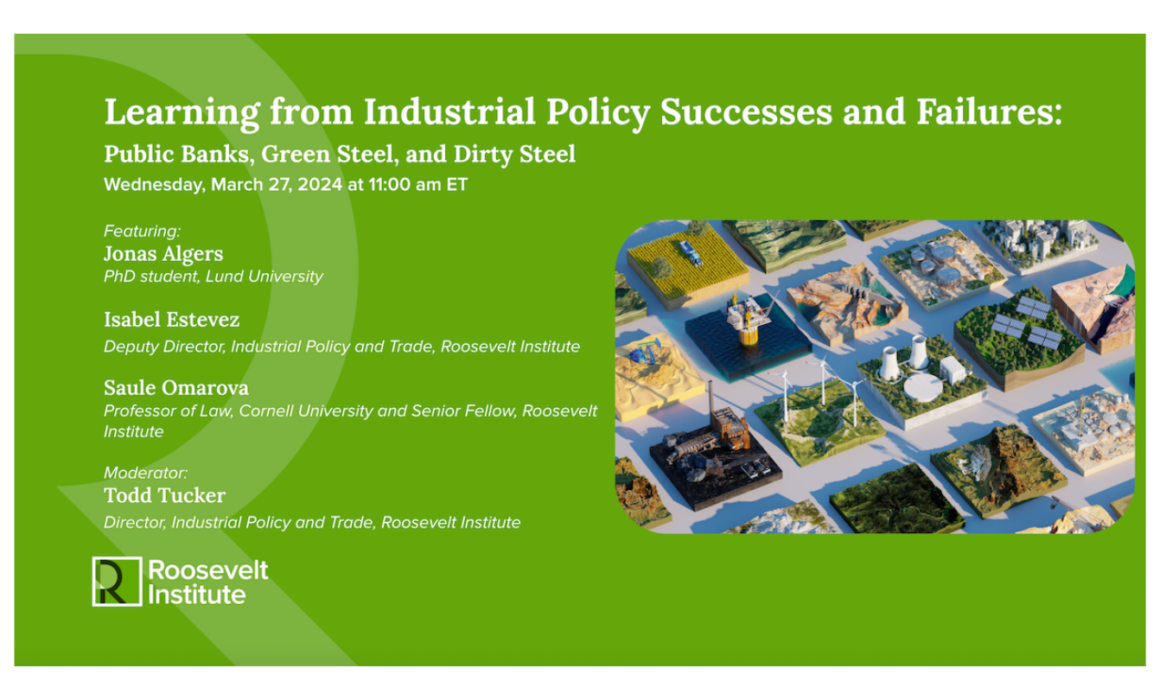The US is amidst an industrial and economic renaissance. Multitrillion-dollar investments through the American Rescue Plan, Infrastructure Investment and Jobs Act, Inflation Reduction Act, and CHIPS and Science Act have led to record levels of domestic manufacturing. The contribution of manufacturing construction to national income is setting new records on an almost monthly basis.
But what comes next for the industrial policy agenda? And how can the US turn its investments into successful economic development strategies that also help to achieve zero emissions by 2050? On March 27, 2024 the Roosevelt Institute hosted an exciting panel of experts to tackle these questions.
First, professor of law at Cornell University and Roosevelt Senior Fellow Saule Omarova discussed her report Finance as a Tool of Industrial Policy: A Taxonomy of Institutional Options, looking at the lost history of national development banks—institutions that can help plug financing and capacity gaps when private markets can’t or won’t. Then, Jonas Algers, Copenhagen-based political economist, showed how public banks and other public institutions are helping make Sweden into the global champion of green, zero-carbon steel, putting new competitive pressures on the US, by discussing his report Leading With Industrial Policy: Lessons for Decarbonization from Swedish Green Steel. Finally, economist and Roosevelt Institute deputy director Isabel Estevez discussed her forthcoming working paper, “The Political Economy of Steel Decarbonization: Prospects and Challenges of a Green Steel Transition in Dearborn, Michigan,” which raises concerns that the US is not doing as much as it could to keep up with its competitors, and outlines ways to turn this around at the federal, state, and local levels.
In Conversation

Todd Tucker
Director, Industrial Policy and Trade, Roosevelt InstituteTodd N. Tucker is a political scientist and director of industrial policy and trade at the Roosevelt Institute, where he helps lead research on global governance, democracy, and the administrative state.
Jonas Algers
PhD student, Lund UniversityJonas Algers is a PhD candidate at the division for environmental and energy systems studies, Lund University where he studies the political economy of steel industry decarbonization. He has been a visiting researcher at the OECD and worked at the Norwegian think tank Manifest on green industrial policy for the oil producing country. He received a master’s degree in economics from The New School.
Isabel Estevez
Deputy Director, Industrial Policy and Trade, Roosevelt InstituteIsabel Estevez is deputy director of Industrial Policy and Trade at the Roosevelt Institute’s Climate and Economic Transformation Program. Her work combines her academic background in institutional and development economics with years of experience advising governments and advocacy organizations on trade, industrial policy and strategic public investment. She has served as Senior Policy Advisor for green industrial policy at the Sierra Club and advised the Ecuadorian Ministry of Planning and Development, among others. Isabel holds a Ph.D. and an M.Phil. from the University of Cambridge, where she specialized in industrial policies for economic transformation.
Saule Omarova
Professor of Law, Cornell University and Senior Fellow, Roosevelt InstituteSaule T. Omarova is the Beth and Marc Goldberg Professor of Law at Cornell University and a Senior Fellow at Roosevelt Institute. Her scholarship focuses on systemic risk regulation, financial technology, and structural trends in global financial markets. Prior to joining academia, she practiced banking law at Davis Polk & Wardwell, a premier New York law firm, and served at the U.S. Treasury Department as Special Advisor for Regulatory Policy to the Under Secretary for Domestic Finance. In 2021, Professor Omarova was President Biden’s nominee for the U.S. Comptroller of the Currency. She holds a Ph.D. degree from the University of Wisconsin-Madison and a J.D. from Northwestern University.



